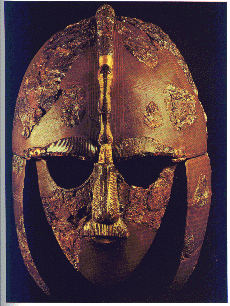Friday Poetry Blogging: A Newly Discovered Beowulf Fragment

I've stumbled upon a previously undiscovered Beowulf fragment! This could make my career, folks!
From contextual evidence, it appears that this seven-line section, which radically diverges from the traditional verse-structure of Old English, should be placed after line 606 of the poem as it currently stands, at the end of Beowulf's retort to Unferth. I've already begun working up the apparatus for the publication of a student edition; comments are welcome.
Beowulf cwæþ to Unferþe:*
Ic eom to hæmedlic for þissum meoduhealle,
To hæmedlic for þissum meoduhealle,
Ic tobrede Grendel.
Ic eom wigend, gecnawast þu hwæt ic mæne?
Ac ic com to Hroðgare on þære hronrade.
On þære hronrade, on þære hronrade, gea.
Ic com to Hroðgare on þære hronrade.
---------------
* The invaluable assistance of Mr. R. S. Fred is most gratefully acknowledged.
---------------
Old English to Modern English letter "conversions":
æ = a
þ = th
ð = th
---------------
Glossary:
1) hæmedlic: So far as I know, this word is otherwise unattested in Old English. However, it is clear enough that it is an adjective formed from the noun "hæmed," which means "sexual intercourse" (the adjectival ending -lic being equivalent to Modern English -like or even, in some cases, -y).
2) meduheall: mead-hall
3) tobredan: to tear apart
4) wigend: warrior
5) mænan: to tell, to intend, to mean
6) hranrad: literally, "whale-road," a kenning for "sea, ocean" (a kenning being a poetic compound that stands in for a more common word)
---------------
In other poetry news, the marvelous Geoffrey Chaucer has written yet another poem of muchel sentence and solaas, the masterful "Cipher of Leonardo."


<< Home